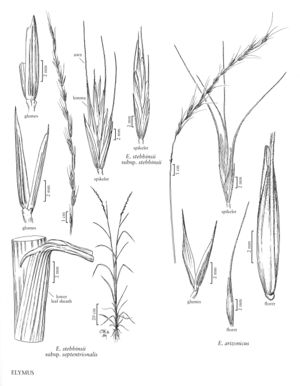familyPoaceae
subfamilyPoaceae subfam. Pooideae
genusElymus
speciesElymus stebbinsii
subspeciesElymus stebbinsii subsp. septentrionalis
Difference between revisions of "Elymus stebbinsii subsp. septentrionalis"
Common names: Northern stebbins' wheatgrass
Treatment appears in FNA Volume 24. Treatment on page 329.
FNA>Volume Importer |
FNA>Volume Importer |
||
| Line 16: | Line 16: | ||
-->{{Treatment/Body | -->{{Treatment/Body | ||
| − | |discussion=<p | + | |discussion=<p>Elymus stebbinsii subsp. septentrionalis grows primarily in the Sierra Nevada. Its range extends from near the Oregon border to Tulare County, and includes the coastal mountains north of San Francisco Bay.</p> |
|tables= | |tables= | ||
|references= | |references= | ||
| Line 32: | Line 32: | ||
|basionyms= | |basionyms= | ||
|family=Poaceae | |family=Poaceae | ||
| + | |illustrator=Cindy Roché and Annaliese Miller | ||
|reference=None | |reference=None | ||
|publication title= | |publication title= | ||
|publication year= | |publication year= | ||
|special status= | |special status= | ||
| − | |source xml=https:// | + | |source xml=https://bibilujan@bitbucket.org/aafc-mbb/fna-data-curation.git/src/314eb390f968962f596ae85f506b4b3db8683b1b/coarse_grained_fna_xml/V24/V24_466.xml |
|subfamily=Poaceae subfam. Pooideae | |subfamily=Poaceae subfam. Pooideae | ||
|tribe=Poaceae tribe Triticeae | |tribe=Poaceae tribe Triticeae | ||
Revision as of 17:07, 30 October 2019
Lowest visible cauline node usually glabrous, rarely pubescent. Lower leaf sheaths usually glabrous, rarely pubescent. Spike internodes 9-21 mm. Spikelets 13-22 mm. Lemmas awned, awns 8-28 mm.
Discussion
Elymus stebbinsii subsp. septentrionalis grows primarily in the Sierra Nevada. Its range extends from near the Oregon border to Tulare County, and includes the coastal mountains north of San Francisco Bay.
Selected References
None.
Lower Taxa
None.
